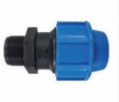Oct . 06, 2024 16:21 Back to list
ppr pipes products
Understanding PPR Pipes and Products A Comprehensive Overview
With the increasing demand for durable and efficient plumbing systems, PPR (Polypropylene Random Copolymer) pipes have gained significant attention in the construction and engineering industries. Known for their excellent resistance to temperature and pressure, PPR pipes offer a cost-effective solution for both residential and industrial applications. This article aims to provide a comprehensive understanding of PPR pipes and their various products.
What are PPR Pipes?
PPR pipes are made from a thermoplastic polymer, known for its high resistance to thermal and mechanical stress. This unique polymer structure gives PPR pipes their distinguishing features they are lightweight, flexible, and have a long service life, often exceeding 50 years. Additionally, PPR pipes are corrosion-resistant and do not suffer from rust or electrolysis, making them ideal for conveying water and other fluids, including chemicals.
Key Features of PPR Pipes
1. Durability PPR pipes are robust and can withstand high pressure and temperature variations. They typically function in temperature ranges from -20°C to 95°C, making them suitable for hot and cold water systems.
2. Chemical Resistance Unlike metal pipes, PPR pipes do not react with chemicals, meaning they are less prone to degradation over time. This property is particularly useful in industrial applications where fluids may be corrosive.
3. Cost-Effectiveness PPR pipes are generally more affordable than traditional materials like copper or steel. Additionally, their lightweight nature reduces transportation and installation costs.
4. Low Heat Conductivity PPR pipes have low thermal conductivity, making them energy-efficient. They help maintain the temperature of the fluid passing through, reducing energy loss.
5. Eco-Friendly PPR is a recyclable material, which contributes to environmental sustainability. With a focus on eco-friendly building materials, using PPR pipes aligns with green construction practices.
Applications of PPR Pipes
ppr pipes products

PPR pipes find a wide range of applications in various sectors
- Residential Water Supply PPR pipes are commonly used in domestic plumbing systems for both cold and hot water supply due to their high-temperature resistance. - Industrial Uses Industries use PPR pipes for transporting chemicals, liquids, and gases. Their chemical resistance makes them a safe option for managing hazardous materials.
- Irrigation Systems In agriculture, PPR pipes are utilized for irrigation systems that allow for effective water distribution across vast areas.
- Heating Systems PPR pipes are also employed in underfloor heating systems, where they help deliver hot water efficiently.
PPR Products Fittings and Accessories
To ensure a complete plumbing system, various fittings and accessories are used in conjunction with PPR pipes. These include
- Elbows and Tees To facilitate directional changes in piping. - Adapters For connecting PPR pipes to other types of plumbing materials. - Valves To control the flow of water through the system.
These accessories are manufactured using the same PPR material, ensuring compatibility, durability, and leak-free connections.
Conclusion
PPR pipes have emerged as a leading choice for modern plumbing systems due to their durability, efficiency, and cost-effectiveness. As industries continue to seek sustainable and reliable solutions, PPR pipes and their products will undoubtedly play a crucial role in the development of infrastructure worldwide. Whether for residential, industrial, or agricultural use, the advantages of PPR pipes make them an excellent investment for the future.
-
High-Quality PVC Borehole Pipes Durable & Versatile Pipe Solutions
NewsJul.08,2025
-
High-Quality PVC Perforated Pipes for Efficient Drainage Leading Manufacturers & Factories
NewsJul.08,2025
-
High-Quality PVC Borehole Pipes Durable Pipe Solutions by Leading Manufacturer
NewsJul.08,2025
-
High-Quality PVC Borehole Pipes Reliable PVC Pipe Manufacturer Solutions
NewsJul.07,2025
-
High-Quality UPVC Drain Pipes Durable HDPE & Drain Pipe Solutions
NewsJul.07,2025
-
High-Quality Conduit Pipes & HDPE Conduit Fittings Manufacturer Reliable Factory Supply
NewsJul.06,2025

